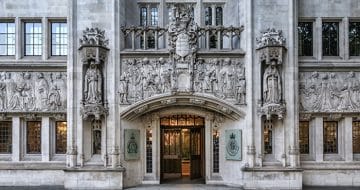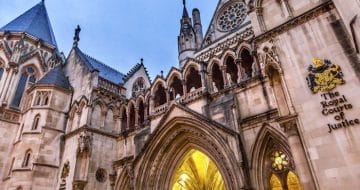Tim Crosland slapped with £5k fine for leaking Heathrow judgment

A barrister who revealed the Supreme Court’s decision on Heathrow’s third runway a day before it was due to be made public has avoided a prison sentence for contempt of court.
Tim Crosland, a qualified barrister and director of environmental group Plan B, was instead handed a £5,000 fine. The penalties for contempt of court are imprisonment of up to two years and/or an unlimited fine.
Speaking outside the Royal Courts of Justice before the hearing, the climate campaigner told reporters the prospect of going to prison “is a small price to pay for the truth coming out”.
He had been hauled before three Supreme Court justices today in proceedings brought by the Attorney General, Michael Ellis QC MP.
In December, Crosland sent an embargoed copy of the judgment to the press after learning that the court had overturned a Court of Appeal decision blocking Heathrow’s plans for a third runway.
Crosland had an advance copy as one of the parties to the case and deliberately “breached the embargo as an act of civil disobedience”.
The leak prompted a strong reaction among lawyers, and Crosland himself saying he fully expected to be disbarred as well as be done for contempt.
But the eco-barrister said the leak was necessary “to protest the deep immorality of the Court’s ruling”.
Sentencing, Lord Lloyd-Jones, chair of the panel, which included Lords Hamblen and Stephens, said, “our penalty is necessary and proportionate to protect the integrity of the judiciary and its judgments.”
In his opening submissions, Crosland, representing himself, said evidence that the Heathrow expansion would expose the public to “extreme danger” had been deliberately suppressed. “The antidote to that suppression was the spotlight of publicity that would follow from breaking the embargo,” he said.
Crosland said his breach was a “reasonable and proportionate measure” to prevent harm from climate change.
The Attorney General, represented by Aidan Eardley of 5RB Barristers, said the breach was in “flagrant defiance” of the Supreme Court and that it should take into account “the effect [the case] will have on other litigants who feel disappointed with case outcomes”.
Eardley said: “The message being sent is that if someone feels strongly enough about a judgment they can breach the embargo and the Attorney General is concerned that does not catch on.”
Today’s ruling is of particular note given Supremes have never before sat at the main law courts of England and Wales, legal commentator Joshua Rozenburg reported earlier today.

